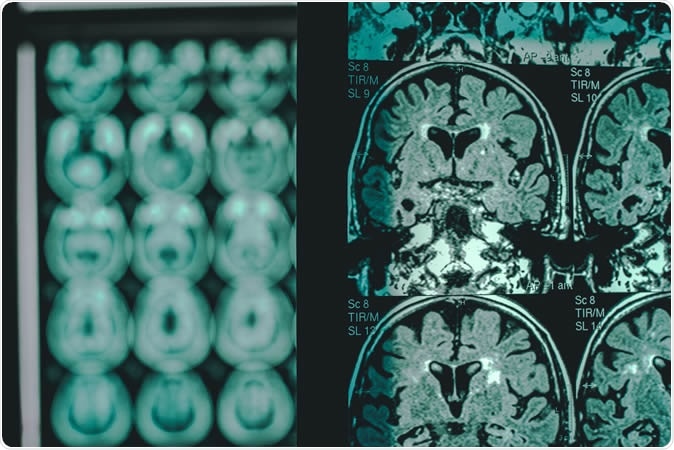For the first time, researchers have proven that the brain is capable of producing new nerve cells even at the age of 90 and above. It was earlier believed that new cell production in the brain stops after a certain age and there is a rapid loss of neurons. Researchers believe that this finding could pave the way for new research in age related dementia and Alzheimer’s disease. The results of the study were published in the journal Nature Medicine.

Alzheimer's disease on MRI. Image Credit: Atthapon Raksthaput / Shutterstock
The team of Spanish researchers noted that there is a production of new nerve cells in the hippocampus region of the brain. These regions of the brain are connected with memory, mood and cognitive functions. They called this phenomenon adult hippocampal neurogenesis. The authors of the study write that this rate of adult hippocampal neurogenesis slows and declines rapidly when a person is diagnosed with Alzheimer’s disease even during early stages of the disease. This finding when perfected could help diagnosed early stages of dementia and Alzheimer’s say the researchers.
The team looked at post-mortem tissue from adults who had a healthy brain at death and were aged between 43 and 87 years. María Llorens-Martín, a neuroscientist at the Autonomous University of Madrid and the senior researcher on the team said that healthy brains contained newly born neurons. As the age of the brains progressed, the decline in these neurons was modest they noted as the brains aged. For examples brains aging from 40 to 70 showed a decline of about 40,000 to 30,000 per cubic millimetre in the new neurones at the dentate gyrus region of the hippocampus. The rates fell sharply among patients with Alzheimer’s disease aged between 52 and 97. They noted that new neurones were still present in the brains of individuals over the age of 90 years.
An adjoining commentary with the article said that this was a one off finding but this raised the “tantalising possibility that halting or reversing this decline might slow Alzheimer’s”. According to Rosa Sancho, head of research at Alzheimer’s Research UK, “This research shows that we can continue to produce new [nerve cells] even into our 90s . . . Alzheimer’s radically accelerates the rate at which we lose nerve cells and this research provides convincing evidence that it also limits the creation of new [ones] . . . Larger studies will need to confirm these findings and explore whether they could pave the way for an early test to flag those most at risk of the disease.”
Researcher Llorens-Martín said, “This is very important for the Alzheimer’s disease field because the number of cells you detect in healthy subjects is always higher than the number detected in Alzheimer’s disease patients, regardless of their age… It suggests that some independent mechanism, different from physiological ageing, might drive this decreasing number of new neurons.” She thanked the individuals who donated their brains to the study. She added, “I believe we would be generating new neurons as long as we need to learn new things. And that occurs during every single second of our life.”